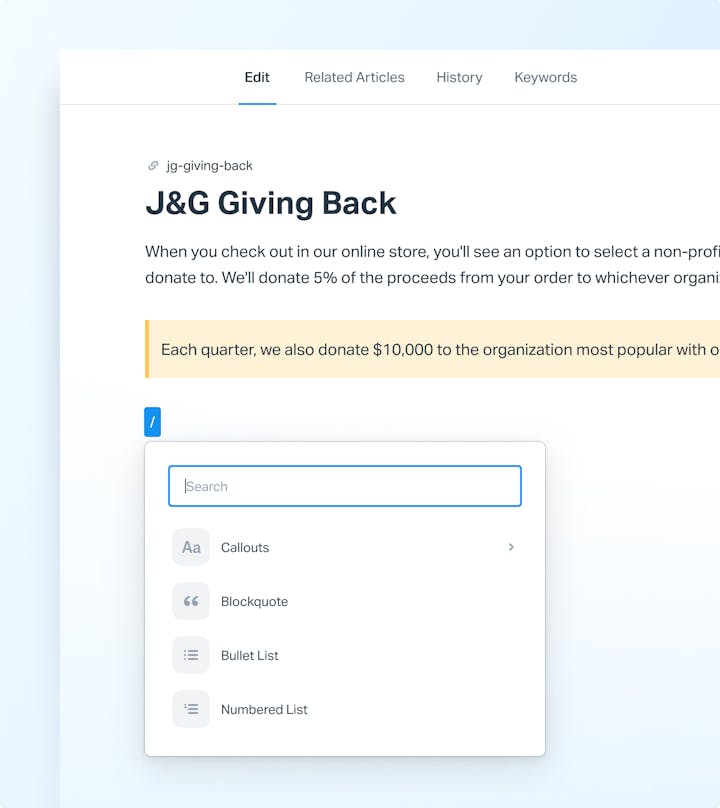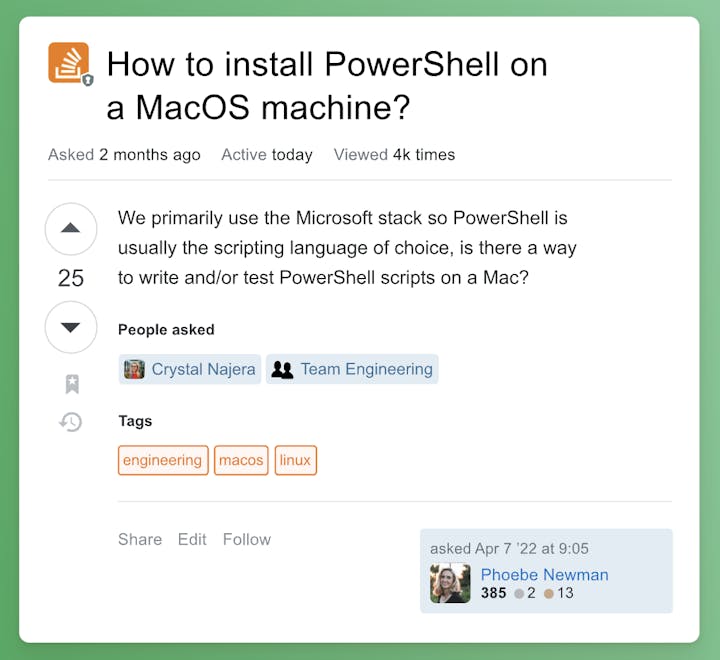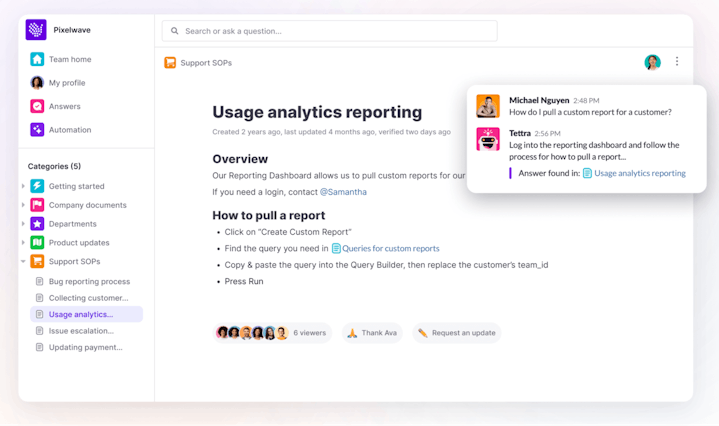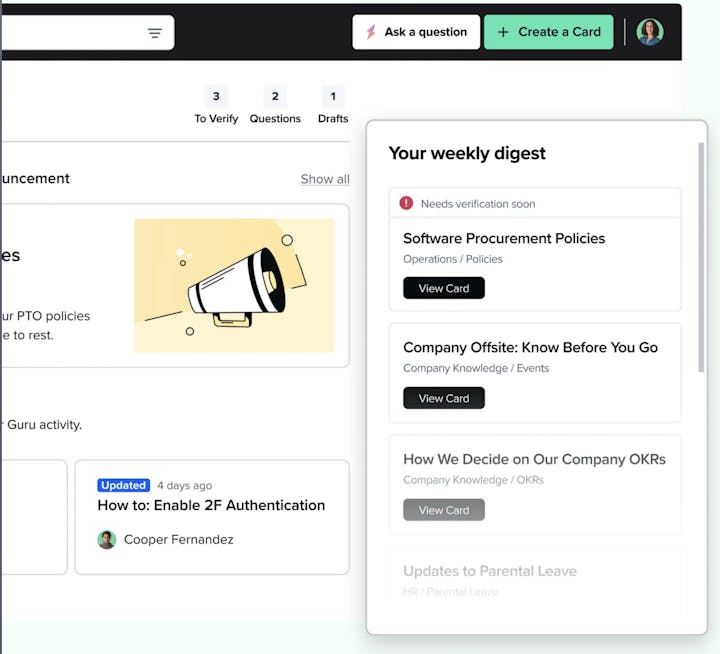The 8 Best Knowledge Management Tools Compared (2023)


Knowledge management is increasingly important in today’s distributed workforce. The most effective support teams need accessible, up-to-date, and accurate information to do their jobs.
With a plethora of knowledge management tools on the market, it can be tough to understand which tool is the best fit to organize your team's knowledge and documentation.
To help out, we've put together a list of some of the best options for each use case.
What is knowledge management?
Knowledge management is a broad term that describes the ways we gather, store, and share information.
Every organization contains a ton of knowledge, but getting that knowledge documented and accessible can be challenging. When your organizational knowledge is tied up in people’s brains or in tools that are hard to find and access, your team and your customers are unable to benefit from it.
The easiest way to solve that problem is to use a great knowledge management tool.
What are knowledge management tools?
Knowledge management tools are applications that help you collect, organize, and distribute information. A huge variety of them exist — designed for different use cases and needs — but the end goal is the same: organizing and making use of your knowledge.
Simply having a knowledge management tool available won’t make knowledge more accessible. Effective knowledge management requires careful thought and disciplined behavior:
Support agents need to create or update documentation for resolving issues.
Internal users need to remember to check your knowledge management tool as the first stop when they have questions.
Customers need to trust that your help center has valuable resources and to use it when they need help.
When implementing a knowledge management tool, it’s critical to look at the big picture and consider what new processes and habits your team and organization will need to adopt. If you’re able to implement the tool and adopt those new behaviors, knowledge management software can enable improved collaboration, increased efficiency, and continuous learning.
For customer support teams, knowledge management systems also play a foundational role in improving self-service.
Types of knowledge management tools
There are many different ways to manage an organization’s knowledge, and different tools reflect those different approaches.
The type of tool you choose depends heavily on the specific needs of your team or situation. For example, some knowledge management tools are focused on internal users, while others are focused on external use cases. Other tools might blend both use cases, enabling knowledge sharing across your organization and your customers.
To help make picking the right tool easier, it’s useful to break them down into a few key categories:
Knowledge bases and wikis: These tools are used to create a central repository of information where employees or customers can easily search for and access company knowledge. Standard knowledge bases are typically maintained by a small group of internal editors, while wikis allow collaborative editing (like Wikipedia).
Document management systems: Most folks are familiar with these classic systems. These are tools whose focus is firmly on creating, storing, and organizing information in documents, such as Google Docs or Dropbox.
Collaboration tools: These tools allow team members to collaborate on tasks, share ideas, and store project-related knowledge. They typically include chat functions, project management features, and document editing capabilities.
Personal knowledge management tools: Personal knowledge management (PKM) tools apply many of the same principles used by standard knowledge bases to collect, structure, and share information at the personal level. These apps facilitate note-taking, idea mapping, archiving, categorizing, and retrieval of information, enhancing learning and productivity by creating a personalized knowledge base.
Question and answer tools: Q&A tools enable users to ask questions and get answers from other users. They’re interactive and rely on participation from across your organization. Over time, these tools can create helpful libraries full of answers to your most commonly asked questions.
The best knowledge management tools in 2023
Below are eight tools that you can use to better organize and manage your personal or professional knowledge.
1. Help Scout
Best knowledge management tool for support teams.
Help Scout is a complete platform for managing your customer communications. And while it can transform nearly every aspect of your customer communications, one fantastic part of Help Scout is Docs, its knowledge base component.
Docs can be highly customized to match your brand, but it’s beautiful and super easy to use right out of the box. You can launch Docs and create valuable knowledge articles within minutes, making knowledge instantly accessible to both internal users and customers alike.

Since Docs is part of the Help Scout platform, plans also include a ton of features that can help you maximize the impact of your knowledge. For instance:
Beacon enables you to embed a chat-style widget within your app or on any page of your website, meaning users can access your help center without needing to navigate away from the page they’re already on.
Docs is also deeply integrated with Help Scout’s shared inbox. Your support team can share links to your knowledge base articles without needing to copy and paste or leave their conversation, meaning your customers can get faster responses (and your agents will have fewer headaches).
With powerful search capabilities, detailed reporting, and the rest of the Help Scout platform behind it, Docs is a great fit for growing support teams of all kinds. There’s no easier way to make your organizational knowledge available to your customers and your team.
Price: Free trial available. Plans start at $20/user per month.
Learn more about Help Scout:
2. Obsidian
Best personal knowledge management tool.

Obsidian is designed to help individuals build a personal knowledge base.
It uses a unique “networked” note-taking approach where notes are stored in plain text and can be linked together, forming a web of interconnected information that is easy to navigate and expand.
Obsidian has a vibrant community of plug-in authors and supporters who create a rich and customizable ecosystem for folks who love to tinker.
For someone looking to take a structured approach to their own knowledge and documents — outside of work — Obsidian is a powerful tool that provides an incredible experience.
Price: Free for personal use, with optional paid add-ons. Commercial plans start at $50/user per year.
3. Stack Overflow for Teams
Best tool for question-and-answer-style knowledge management.

Stack Overflow for Teams is the lesser-known sibling of the classic engineering tool Stack Overflow.
Instead of a public board, Teams gives a private take on the question-and-answer-style tool, specifically designed to facilitate knowledge sharing within a single organization.
It allows team members to ask questions and get answers from their colleagues, thereby encouraging knowledge sharing and collaboration. The Q&A format also creates a searchable knowledge base — similar to a community forum — that preserves valuable information over time.
Price: Free for up to 50 users, with limited functionality. Paid plans start at $6.50/user per month.
4. Logseq
Best open-source knowledge management software.

Logseq is a privacy-focused open-source platform for knowledge management and note-taking.
It's designed to support the implementation of non-linear and networked thought processes. This method of note-taking is sometimes known as “linked thought” and is similar to Obsidian, where each note or piece of information can be linked to others, creating an interconnected web of knowledge.
For users who are looking to support the open-source ethos or who simply want a security-focused platform for their knowledge management, Logseq is a fantastic choice.
Price: Free for personal use.
5. Coda
Best knowledge manager for no-code enthusiasts.

Coda is a collaboration-focused platform that combines key features of documents, spreadsheets, databases, and project management tools — all in a single interface.
Coda’s Swiss Army knife approach allows users to create and customize tools to fit their specific workflows: everything from simple to-do lists to complex business processes. Coda is supported by a diverse ecosystem of plugins (called “Packs”) that allow you to draw information from other apps into Coda, taking a simple doc format and pulling in information from tools like Figma, Slack, Airtable, and more.
If you want to create an integrated, app-like experience using multiple tools for your team’s knowledge base, Coda can make it happen — all without any code.
Price: Free for all users, with limited functionality and integrations. Paid plans start at $10/month per Doc Maker (Coda only charges for users who can create new docs).
6. Tettra
Best knowledge management tool for Slack.

Tettra is popular knowledge base software that allows companies to create a centralized repository for their collective knowledge that is easily accessible in Slack.
The standout feature of Tettra is the depth of the integration with Slack, which allows users to access and interact with their Tettra knowledge base without leaving the Slack environment. For instance, you can search your Tettra knowledge base directly from Slack or turn a Slack conversation into a new Tettra page.
Reducing the barrier to creating and consuming knowledge is critical to a robust knowledge management process, and for teams that live in Slack, Tettra makes it as easy as possible.
Price: Free trial available, along with a free plan with limited functionality and users. Paid plans start at $8.33/user per month.
7. Guru
Best internal knowledge tool for embedding in your workflow.

Guru is a flexible solution that is best known for its emphasis on delivering the information your team needs when and where you need it.
Unlike traditional knowledge bases, Guru integrates directly into your workflow, enabling team members to access and capture knowledge without leaving their work. Its biggest key feature is its browser extension, which ensures that no matter where your work happens, Guru is there for your team.
This makes Guru particularly great for teams who need on-demand and in-context information. It works for all kinds of use cases, from new employees looking for information on benefits to a CSM who needs quick access to specific documents during a meeting with a customer.
Price: Free for teams of up to three users (with limited functionality). Paid plans start at $10/user per month.
8. Notion
Best knowledge management tool for collaboration.

Notion is a powerful, all-in-one app that enables teams to organize and collaborate on a diverse set of information types. It combines features of note-taking, task management, databases, and project management into a single place.
Its flexible structure supports the creation of hierarchical pages, allowing users to organize information in a way that suits their workflow. This means Notion can serve in a variety of ways, including as your company wiki, a place for capturing meeting notes, a project management tool, or as your process library.
For teams with a diverse set of knowledge, Notion packs in everything and the kitchen sink, creating a space anyone can use their way.
Price: Free for individuals. Paid plans start at $8/user per month.
Improve your knowledge management
Different knowledge management products exist for the many different use cases out there, but they all serve similar goals: helping people — individuals, teams, or companies — get more value from the knowledge they already possess.
If you'd like to improve your customer experience by making it easier for your customers to access essential knowledge about your product, you should take advantage of Help Scout’s 15-day free trial.
It’s the easiest way to improve your customer communications at scale — give it a try today!
The Supportive Weekly: A newsletter for people who want to deliver exceptional customer service.



